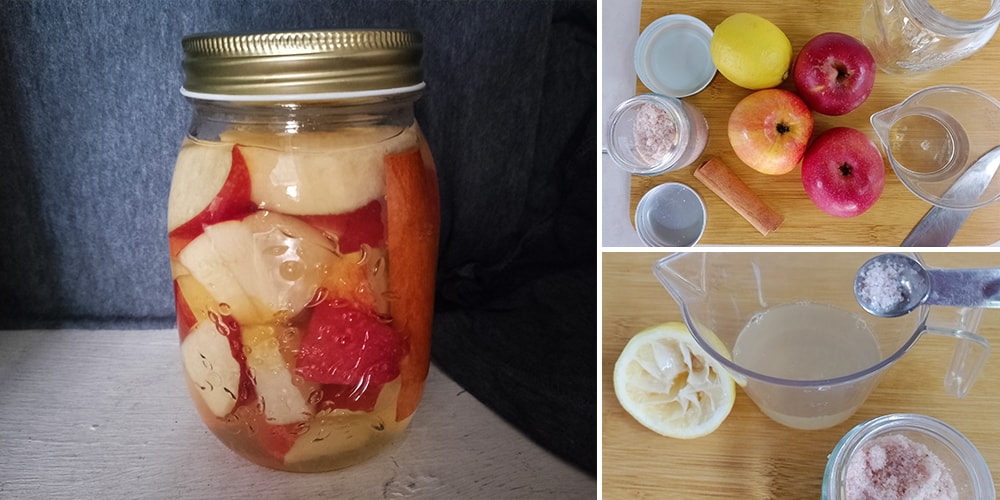
DIY Probiotic Fermented Apples
Many fruits and vegetables can be fermented to make good use of them and extend their shelf life. Their final product also harbors lots of health benefits, it is a shame to leave them out to rot. Among many fruits, apples are one of the easiest to ferment because of their availability. It is also versatile for many culinary uses. When fermented past the stage of dry cider and with culture starter microorganisms, it will turn into apple cider vinegar. So, let’s see how to make probiotic fermented apples.
What Can You Get from Fermented Apples?
Probiotics. Naturally fermented products contain probiotics that are needed for the smooth function of the gut. Probiotics cleanse the digestive system, flush away toxins and prevent their accumulation.
Fermented apples can then be used in culinary applications like dressings, apple sauce, relish or baked goods like pies. It is also perfect as a snack and provides many health benefits such as:
Digestive Aid. The probiotics in fermented apples maintain the balance of beneficial bacteria in the gut. It aids in better digestion and solves related issues.
If you are currently taking antibiotics, one of their side effects is diarrhea as antibiotics eliminate both good and bad gut bacteria. Fermented apples may lessen its duration by reducing the C. difficile infection.
Detoxify the Body. The enzymes and compounds in apple cider are effective antioxidants. These compounds bind with the toxic metals to flush them out of the body. Fermented apple contains malic acid which removes heavy metals, poisons and carcinogens in the liver.
Prevent Cancer. The antioxidants found in fruits are beneficial in removing harmful toxins that damage the cells and DNA. The flavonoids in apples can prevent the growth of cancer cells, especially in the intestine, gallbladder, liver and breasts.
Reduce Inflammation. Apples are rich in phytochemicals such as phenolic acid and flavonoids. These compounds lessen oxidative stress and lower inflammation which may cause chronic illnesses. Drinking and eating fermented apples keeps the arteries clear and prevents the development of other health problems.
Improve Heart Health. With its ability to reduce inflammation, fermented apples may also prevent a range of heart diseases. It helps manage the cholesterol level and blood pressure to support proper blood circulation. The natural fibers in apples such as pectin are known to lower the cholesterol level naturally to prevent strokes and other cardiovascular problems.
Manage Weight. If you are aiming to lose weight and maintain an acceptable body measurement, try adding fermented apples to your balanced diet. An ounce of fermented apple juice daily may help cut calorie consumption by suppressing appetite. It may also reduce the accumulation of visceral fat and balance the body mass index.
Help with Diabetes. Apple cider may lower the blood sugar or glucose to an acceptable level when fasting. It may help with Type 2 diabetes and prevent its complications. Taking fermented apples is best for preventing diabetes if you are at risk of contracting it.
May Improve Brain Functions. Fermented foods and beverages are seen to help slow cognitive decline in older people. Aging can cause changes in the gut microbiota which may also increase the risk of neurological diseases by cutting down nutrients and decreasing their bioavailability. Fermented apples, when used in moderation, help balance the gut flora to improve intestine permeability and prevent the degeneration of the brain.
Here you can learn more about fermenting vs pickling.
DIY Probiotic Fermented Apples
You can do your own probiotic-filled fermented apples at home with no trouble. It has simple ingredients and a straightforward process. You only need a few days for it to ferment to perfection.
It is referred to as lacto-fermentation where you allow natural bacteria like Lactobacillus to transform apples into vinegar. During the process, the natural sugars in apples are converted into lactic acid to help in food preservation. The acidic environment is not conducive for the harmful bacteria to thrive.
In many recipes, you may read about starter culture or cultivation medium that has been colonized by microorganisms. This is the ingredient that kick-starts the fermentation process.
With apples, you may not need a starter culture since they ferment quickly compared to other fruits and vegetables.
Homemade Fermented Apple Recipe
What you will need:
- Apples (enough to fill two-thirds of the jar)
- 1/4 cup filtered water and more to fill your jar
- 1/2 tsp pink Himalayan salt or sea salt (do not use table salt)
- Juice from half a lemon
- 1 cinnamon stick
- Half-quart size mason jar with an airtight lid
- Cored apple just enough to fit the jar mouth, to act as a fermentation weight
Steps:
- Chop and remove the core and seeds of the apples. You can leave the peel on if you like, but your fermented apples will have a darker color because of the tannins in the peel.

- Add the chunks to a clean mason jar. Then, add the cinnamon stick.

- In a small bowl or glass, combine the filtered water, lemon juice and pink salt.

- Pour the liquid over the apples, adding more water if needed to cover them entirely.

- Add the cored apple to act as fermentation weight which will prevent the chunks from floating, and submerge them entirely in water. If you have fermentation weights at home, you can use them instead.

- Place the jar in a cool and dark place away from direct sunlight for about three to four days. Bubbles will be present, but that is okay as it indicates that fermentation is already taking place.

- Burp the jar once or twice a day by opening the lid to let the excess gas escape.

- Taste the fermented apples and keep them longer if you need a stronger tang. Once the mixture reaches your desired taste, they are ready for eating.
Store the jar in the fridge, to slow down fermentation, and consume it within two weeks.
Notes: If you want to add a starter culture, use one packet (about 1 oz) and combine it with the water, lemon and salt mixture before adding to the apples.
Alternatively, you can use brine from other fermented vegetables you may already have at home. Sauerkraut juice, kombucha, ginger bug and water kefir are the best probiotic brines for fermenting apples.
Why not use table salt? That’s because table salt and iodized salt do not help with fermentation. They only cloud the brine with their anti-caking agent. Himalayan salt, sea salt and kosher salt are great options.
How to Use
There are numerous ways you can use fermented apples, like you would with raw ones. You can add them to smoothies, turn them into pie fillings, and top them in oatmeal and cocktails or any other way you please.
The brine from fermented apples may also be used. You can make it sour by fermenting the apples longer. Treat the brine as vinegar and use it as salad dressing or dilute it with water for a fizzy drink. You may also sip it directly as a tonic but take it in moderation to prevent digestive issues.
Ideally, you can drink an ounce of fermented apple brine during a meal. Enjoy!

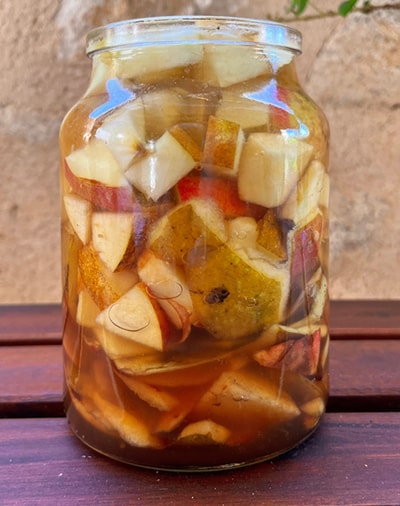
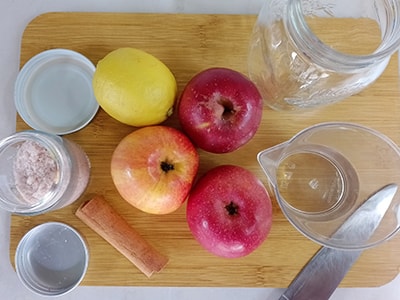
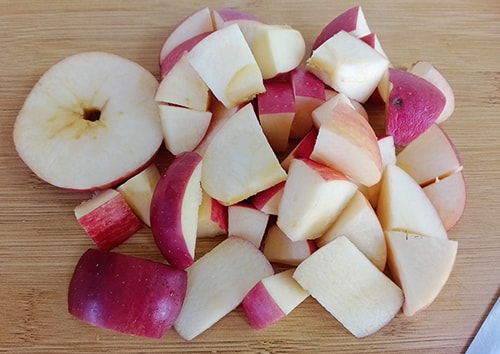
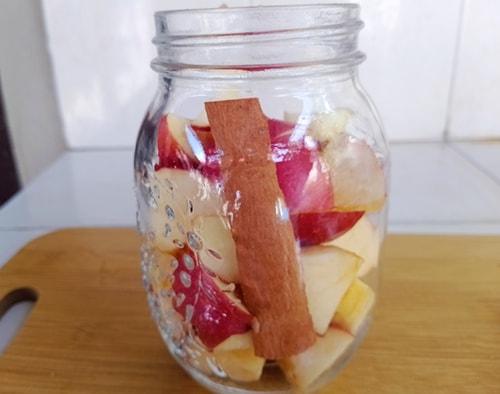
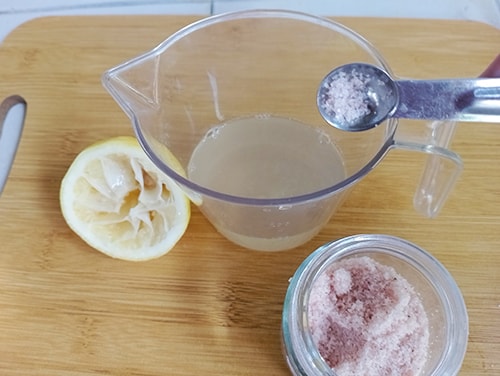
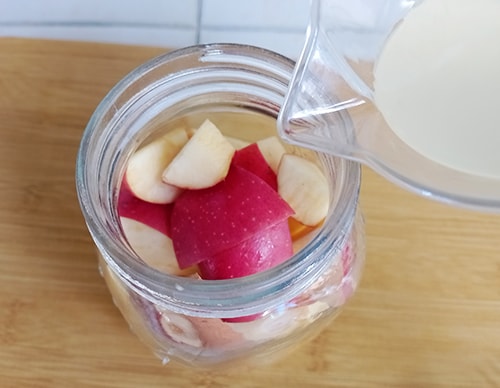
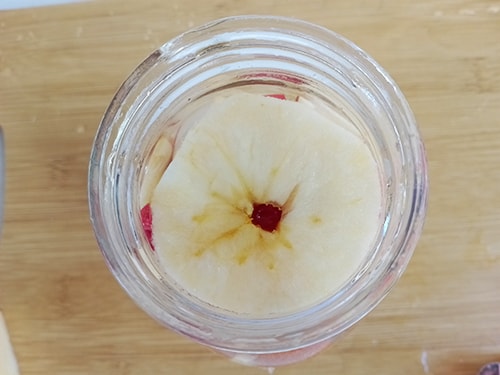
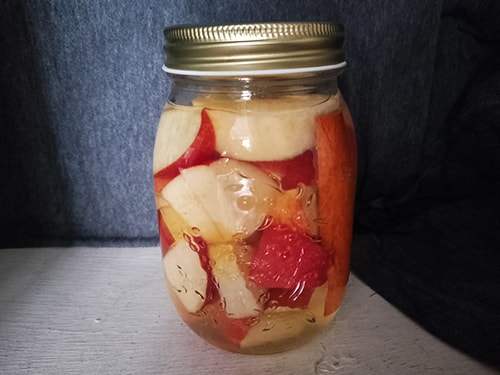
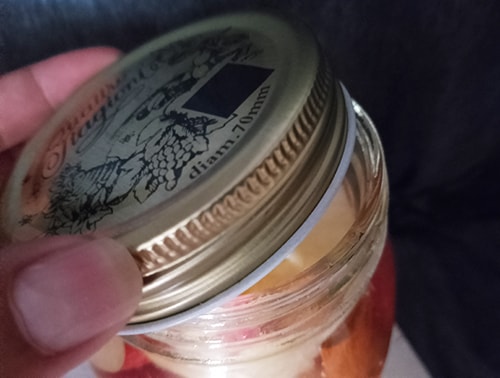
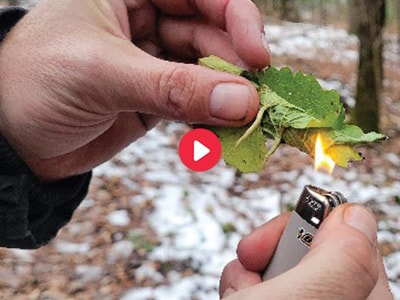
What about kimchi?
It’s a great source of probiotics and so easy to make. Choose from any number methods on utube.
I wonder if I could use the potassium salt substitute to make ferments? Or if there’s a way to make ferments like kraut, without salt? Caring for heart failure patient on very limited sodium diet.
Ann Marie! I’m so glad you put out this information. I can’t wait to go home and try it today.
Thank you for what you’re doing in health care. Keep ’em coming!
once you have your fermented apples can you dehydrate them of can them?
Can you show me how to make Sauerkraut, please